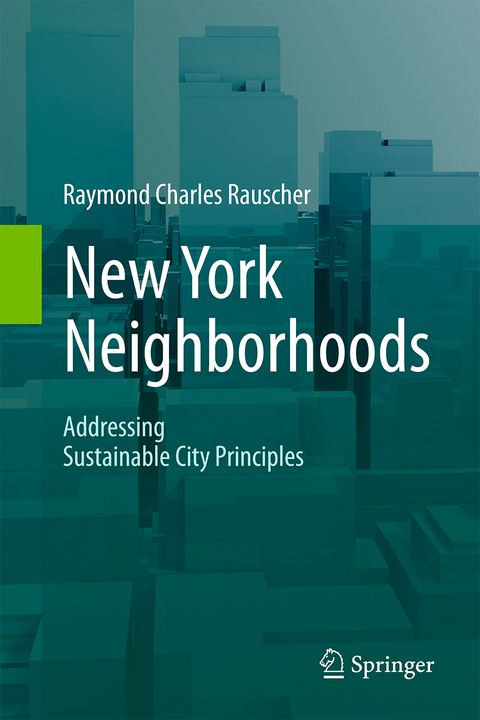
New York Neighborhoods - Addressing Sustainable City Principles
Springer International Publishing (Verlag)
978-3-319-60479-4 (ISBN)
Dr. Raymond Charles Rauscher is a conjoint lecturer at the University of Newcastle, Australia, and a director of Habitat Association for Arts and Environment Inc. Delving into the subject of sustainable urban planning (SUP), Ray completed a PhD (2009) at the University of Newcastle. Ray has at various times lived and worked within the three Greater Sydney Districts that the book focuses on - Sydney Inner West, Greater Parramatta, and St George. Being born in Brooklyn, New York City (1943), he graduated from the City College of New York (Bachelor of Engineering, Civil, 1966). Later, he completed a master's degree (commencing) at the University of Michigan (research submission on Detroit entitled A Solution to the Urban Crisis: Proposal for the Creation of Region Serving New Cities (unpublished 1969). A Masters of Town and Country Planning was completed at Sydney University (1971) with a thesis Community Response to a Redevelopment Proposal (University of Sydney Library Microfilm Dept.). The thesis covered planning conflicts in Erskineville and Newtown (Sydney), and measures to resolve these.Wanting to research further, Ray published (co-author Salim Momtaz) Sustainable Communities: A Framework for Planning - Case Study of an Australian Outer Sydney Growth Area (Springer 2014). Continuing to study urban change, he published (co-author Salim Momtaz) Brooklyn's Bushwick - Urban Renewal in New York, USA (Springer 2014). Ray then brought together long term research (1970-2013) of the City of Sydney inner city areas, resulting in the publication (co-author Salim Momtaz) Sustainable Neighborhoods in Australia: City of Sydney Urban Planning (Springer 2015). Preparing for this book (Cities in Global Transition) meant numerous field trips into the Greater Sydney Districts, as he witnessed municipal and State efforts to adopt SUP practices in the face of global transition (e.g. population movements and settlement changes). On a community note, since 1973 Ray has been a member of the Australian based Social Developers Network (SDN). The Network commenced at the time (late) PM Gough Whitlam (1972-1975) and (late) Tom Uren (Minister for Planning and Regional Development under the PM). Both of these renowned Australians introduced environmental and social bases to urban planning (Ray worked in a Federal program at the time). A number of those Whitlam government planning initiatives have proven pivotal to development of all three districts that the book addresses.
Part 1: Global Urban Change.- Chapter 1. Global Changes and Implications for Cities.- Chapter 2. New York and Sustainable City Principles.- Part II : Manhattan Neighborhoods and sustainable City Principles.- Chapter 3. Lower East Side and Sustainable City Principles.- Chapter 4. Greenwich Village and Sustainable City Principles.- Chapter 5. Hell's Kitchen and Sustainable City Principles.- Part III : Brooklyn Neighborhoods and Sustainable City.- Chapter 6. DUMBO and Sustainable City Principles.- Chapter 7. Brooklyn Downtown and Sustainable City Principles.- Chapter 8. Greenpoint and Sustainable City Principles.- Part IV: Queens Neighborhoods and Sustainable City Principles.- Chapter 9 . Astoria and Sustainable City Principles.- Chapter 10. Jackson Heights and Sustainable City Principles.- Chapter 11. Long Island City and Sustainable City Principles.- Part V : Conclusions and Future Directions.- Ch
apter 12. Directions for Planning Sustainable Cities and Neighborhoods.| Erscheinungsdatum | 19.09.2017 |
|---|---|
| Zusatzinfo | XXXII, 248 p. 139 illus., 107 illus. in color. |
| Verlagsort | Cham |
| Sprache | englisch |
| Maße | 155 x 235 mm |
| Gewicht | 584 g |
| Themenwelt | Naturwissenschaften ► Biologie ► Ökologie / Naturschutz |
| Naturwissenschaften ► Geowissenschaften | |
| Sozialwissenschaften ► Politik / Verwaltung | |
| Schlagworte | Earth and Environmental Science • Human geography • Landscape/Regional and Urban Planning • Migration • Migration, immigration & emigration • Migration, immigration & emigration • Neighborhood level sustainable • Neighborhoods in rapid change • New York sustainable city principles • regional & area planning • Regional & area planning • Sociology • sustainability • Sustainability of urban and regional areas • sustainable development • The Environment • Urban communities • urban planning • Urban Studies/Sociology |
| ISBN-10 | 3-319-60479-1 / 3319604791 |
| ISBN-13 | 978-3-319-60479-4 / 9783319604794 |
| Zustand | Neuware |
| Haben Sie eine Frage zum Produkt? |
aus dem Bereich


